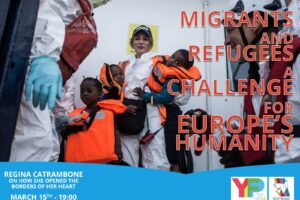
Dear friends,
I write this letter with deep sadness and great frustration, as I learn from the news about the recent tragedies in the Mediterranean Sea.
Yet again, there were two more shipwrecks within which many lives were lost. They leave us behind them, grieving for them, they leave us grieving for us and for what our societies have become. The notion of “bare life” seems to have become the norm in how the European Union and individual Member States at the border of the European Union operate, absconding from their International obligations.They leave behind them many unanswered questions. Questions pointing at terrible truths. This umpteenth disaster underlines the urgency to strengthen the search and rescue operations at sea and to create safe and regular routes for asylum seekers and refugees.
The MAEC staff – the Mediterranean Aid Education Center, expresses deep sympathy to the families and friends of the victims of this most recent tragedy, of which we are only aware thanks to the testimony of survivors.
In the first shipwreck, the victims were 10, who died by suffocation on the lower deck of the boat. Fifty-one survivors were rescued in Lampedusa by the ship Nadir of the NGO Resqship. Their countries of origin are Syria, Egypt, Pakistan and Bangladesh. In the second incident, after receiving first aid from a fishing boat and being transferred to a merchant ship, the Italian Coast Guard rescued 11 survivors in the Ionian Sea and took them to Calabria, to Roccella Jonica. Another 64 people are reported missing at sea. Survivors and missing persons are from Iran, Syria and Iraq, including two accompanied children and two women. The boat departed from Turkey, and the engine seems to have ignited, overturning the hull 110 nautical miles from the Italian coast.. If these data are confirmed, the number of dead and missing people in the central Mediterranean will go up to over 800, an average of almost five dead and missing per day, as of the beginning of this year. These regularly occurring failures at rescuing people at sea, generate a sense of deep frustration and fear, especially when we learn that repeatedly SOS appeals go “unheard”.
Resources for search, rescue and aid operations at sea must be upgraded. More resources must be made available to the Italian Coast Guard. Every shipwreck represents a collective failure and a tangible sign of the inability of states to protect the most vulnerable people, violating their international obligations. Just three days before World Refugee Day, which recalls the tragedy of 120 million people forced to flee wars, violence and persecution, these most recent incidents are even more unacceptable. In addition to the urgent need for European support for search and rescue operations, it is essential to promote real and wider access to safe and legal routes for asylum seekers to reach the European Union. Also, their right to be heard and a fair asylum process must be ensured. Only through such ways, are people not forced to risk their lives at sea.
With sorrow and hope,
Regina Egle Liotta Catrambone



